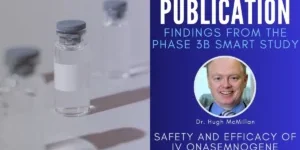New publication: TEFM variants impair mitochondrial transcription causing childhood-onset neurological disease
Lochmüller Lab Members Published as Authors in Nature Communications Study
We are excited to share that the study “TEFM variants impair mitochondrial transcription causing childhood-onset neurological disease”, containing contributions from several lab members, was published in the journal Nature Communications on February 23, 2023. Postdoc members Dr. Kiran Polavarapu and Dr. Emily O’Connor, along with Dr. Hanns Lochmüller, are all authors on the paper.
This international, multi-center study establishes TEFM as a candidatemitochondrial disease gene. Recessive or biallelic TEFM mutations were identified in seven patients from five unrelated families with a wide range of infantile or childhood-onset neurological and neuromuscular symptoms. A combination of clinical phenotyping and muscle pathology along with in silico protein analysis, and mitochondrial function investigations helped in establishing the causal effect of TEFM in these patients. Findings from patients were further supported by zebrafish studies, including movement and neuromuscular analysis1.
These data suggest the consideration of TEFM in the genetic diagnostic workup of patients that present with neonatal or childhood onset mitochondrial encephalomyopathy with fatigable muscle weakness, epilepsy and variable degree of intellectual disability, and some of these patients with neuromuscular junction defect can benefit from early therapeutic intervention.
Read the Full Publication
The article is open access, and available to read here: https://pubmed.ncbi.nlm.nih.gov/36823193/.
Reference
- Van Haute, L., O'Connor, E., Díaz-Maldonado, H., Munro, B., Polavarapu, K., Hock, D. H., Arunachal, G., Athanasiou-Fragkouli, A., Bardhan, M., Barth, M., Bonneau, D., Brunetti-Pierri, N., Cappuccio, G., Caruana, N. J., Dominik, N., Goel, H., Helman, G., Houlden, H., Lenaers, G., Mention, K., … Horvath, R. (2023). TEFM variants impair mitochondrial transcription causing childhood-onset neurological disease. Nature communications, 14(1), 1009. https://doi.org/10.1038/s41467-023-36277-7. PMID: 36823193






